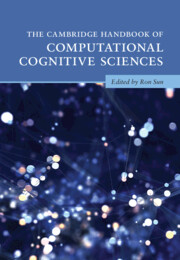The Cambridge Handbook of Computational Cognitive Sciences
The Cambridge Handbook of Computational Cognitive Sciences is a comprehensive reference for this rapidly developing and highly interdisciplinary field. Written with both newcomers and experts in mind, it provides an accessible introduction of paradigms, methodologies, approaches, and models, with ample detail and illustrated by examples. It should appeal to researchers and students working within the computational cognitive sciences, as well as those working in adjacent fields including philosophy, psychology, linguistics, anthropology, education, neuroscience, artificial intelligence, computer science, and more.
- Provides an accessible introduction to the field of computational cognitive sciences
- Combines breadth of coverage of the field with in-depth elucidation by leading scientists, thus useful for experts and non-experts alike
- Appeals to researchers and advanced students in related fields including philosophy, psychology, linguistics, neuroscience, artificial intelligence, and more
Reviews & endorsements
‘Ron Sun shines fresh light on the complex mechanisms underlying human cognition, marshaling expositions from a broad range of experts. Volume 1 shows the diversity of paradigms that can be employed, from neural networks to Bayesian methods to dynamic systems, and then shows how these can be applied to model the underlying mechanisms. While these chapters alone would be worth the price of admission, Volume 2 then offers a rich array of further payoffs in areas ranging from vision, motor control and emotion to creativity and, even, morality.’ Michael Arbib, University of Southern California, USA
‘The Cambridge Handbook of Computational Cognitive Sciences is a great collection of useful chapters. Ron Sun has recruited a stellar set of authors. It will be an excellent resource for cognitive modeling and psychology. It belongs on every modeller's bookshelf and in their library. This book will be very helpful in my and my students' work. I want to read all the chapters, and I will need to read and cite most of them.’ Frank Ritter, Pennsylvania State University, USA
‘Computational models have been central to cognitive science since the 1950s, making important contributions to the design and testing of theoretical explanations of mind. Through chapters by an army of leading experts, this Handbook provides a remarkably broad overview of computational modeling. Researchers and students in cognitive science will find it indispensable.’ Paul Thagard, University of Waterloo, Canada
Product details
April 2023Adobe eBook Reader
9781108620345
0 pages
This ISBN is for an eBook version which is distributed on our behalf by a third party.
Table of Contents
- Volume 1: Part I. Introduction:
- 1. An overview of computational cognitive sciences Ron Sun
- Part II. Cognitive modeling paradigms:
- 2. Connectionist models of cognition Michael S. C. Thomas, James L. McClelland
- 3. Bayesian models of cognition Thomas L. Griffiths, Charles Kemp, Joshua B. Tenenbaum
- 4. Symbolic and hybrid models of cognition Tarek R. Besold, Kai-Uwe Kühnberger
- 5. Logic-Based modeling of cognition Selmer Bringsjord, Michael Giancola, Naveen Sundar Govindarajulu
- 6. Dynamical systems approaches to cognition Gregor Schöner
- 7. Quantum models of cognition Jerome R. Busemeyer, Emmanuel M. Pothos
- 8. Constraints in cognitive architectures Niels Taatgen, John Anderson
- 9. Deep learning Marco Gori, Frédéric Precioso, Edmondo Trentin
- 10. Reinforcement learning Kenji Doya
- Part III. Computational modeling of basic cognitive functionalities:
- 11. Computational models of categorization Kenneth J. Kurtz
- 12. Computational cognitive neuroscience models of categorization F. Gregory Ashby, Yi-Wen Wang
- 13. Models of inductive reasoning Brett K. Hayes
- 14. Analogy and similarity John E. Hummel, Leonidas A. A. Doumas
- 15. Mental models and the algorithms of deduction Philip N. Johnson-Laird, Sangeet S. Khemlani
- 16. Computational models of decision making Joseph G. Johnson, Jerome R. Busemeyer
- 17. Computational models of skill acquisition Stellan Ohlsson
- 18. Computational models of episodic memory Per B. Sederberg, Kevin P. Darby
- 19. Computational neuroscientific models of working memory Thomas E. Hazy, Michael J. Frank, Randall C. O'Reilly
- 20. Neurocomputational models of cognitive control Debbie M. Yee, Todd S. Braver
- 21. Computational models of animal and human associative learning Evan J. Livesey
- 22. Computational and cognitive models of reinforcement learning Kenji Doya
- Volume 2: Part IV. Computational modeling in various cognitive fields:
- 23. Computational models of developmental psychology Thomas R. Shultz, Ardavan S. Nobandegani
- 24. Computational models in personality and social psychology Stephen J. Read, Brian Monroe
- 25. Computational modeling in industrial-organizational psychology Jeffrey B. Vancouver
- 26. Computational modeling in psychiatry Cody J. Walters, Sophia Vinogradov, A. David Redish
- 27. Computational psycholinguistics Matthew W. Crocker, Harm Brouwer
- 28. Natural language understanding and generation Marjorie McShane, Sergei Nirenburg
- 29. Computational models of creativity Sébastien Hélie, Ana-Maria Olteteanu
- 30. Computational models of emotion and cognition-emotion interaction Eva Hudlicka
- 31. Computational approaches to morality Paul Bello, Bertram F. Malle
- 32. Cognitive modeling in social simulation Ron Sun
- 33. Cognitive modeling for cognitive engineering Matthew L. Bolton, Wayne D. Gray
- 34. Modeling vision Lukas Vogelsang, Pawan Sinha
- 35. Models of multi-level motor control Martin Giese, David Ungarish, Tamar Flash
- Part V. General discussion:
- 36. Model validation, comparison and selection Leslie M. Blaha, Kevin A. Gluck
- 37. Philosophical issues in computational cognitive sciences Mark Sprevak
- 38. An evaluation of computational modeling in cognitive sciences Margaret A. Boden.



